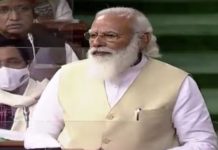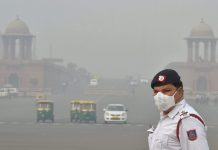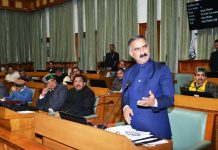For some years, various Indian media platforms got it wrong when they predicted that Pakistan is on the verge of collapse as a sovereign state. The cooked up debates on TV lacked common sense, with participants oblivious to principles of statecraft, writes Gopal Misra
With Chinese President, Xi Jinping, in Moscow, it is a wake-up call for India. Russia and China were never so close to each other. Pakistan too finally has reaffirmed its alliance with the Dragon this March.
China has outwitted the USA in the Middle-East by establishing the Saudi-Iran détente, and at the same time luring Pakistan into its fold. Beijing banks are already rolling over $1.3 billion financial assistance to Pakistan to rescue it from an embarrassing financial default amidst the reports that the IMF may now cough up a huge sum of $ 6.5 billion as a bailout for the client state.
These breath-taking events are taking place, thus influencing the global play of forces. India knows that she has already ceded diplomatic initiative, if any left, when the world watched in awe, Russian President, Vladimir Putin, driving a car in the newly acquired Russian-speaking districts of Ukraine. It is not surprising that the Indian diplomacy appeared to be confused and without any direction to cope up with the new developments, and the Indian media, both electronic and print, is being seen behaving like an ostrich burying its long neck in the sand during a desert storm.
In recent years, the various platforms in the Indian media have been abuzz with predictions that Pakistan is on the verge of collapse as a sovereign state. Many social media sites even claimed that Pakistan may witness a repeat of 1971, when Bangladesh came into being. Little did they realise that Bangladesh had scripted the epitaph on the grave of the two-nation theory, but the people in Pakistan today continue to subscribe to the sectarian vision of Islam. Therefore, the propagandas in India, including cooked up debates, lacked both common sense as well as the principles of statecraft, yet narratives are being woven like the medieval bards praising the valour of the ruler of the day.
The ruling BJP’s social media cell could be traced for this faux pas, which might have had a purpose in projecting PM Narendra Modi in his macho avatar adorned in ultra nationalist façade. It might have served in increasing the party’s tally in the previous Lok Sabha elections, but the country is now under the spell of rhetoric sans reason. Unfortunately, during the past nine years, these cock and bull stories which were for the purpose of winning polls, have become a norm of the media proxies of the ruling party, thus the country’s mainline media too is subscribing to it.
India Stunned
The mandarins of the well-groomed External Affairs Ministry (EAM) too appear to have been swayed by these narratives. It appears that they too were stunned this March, when China’s Xi Jinping stunned the global capitals by his aggressive diplomacy.
The Indian media owners cannot absolve themselves for India being cornered in the current international developments. Earlier, there used to be highly accomplished diplomats and journalists writing on strategic issues, but in recent years, such debates are being considered blasphemous or “anti-national”, thus Indian media is now being seen in tune with government’s political rhetoric, even sacrificing facts. The strategic issues are being discussed only for projecting the ruling party. Pakistan is no exception.
Amidst these historical geo-strategic developments, Xi Jinping, with his mysterious smile gets Iran and Saudi Arabia to restore their fractured diplomatic relationship, and flies to Moscow, and delivers a strong message to Ukraine and the US-led western powers either to agree to Dragon’s peace proposal or be ready to be perished if the ongoing 13-month old European conflict further escalates. The message is clear that the Chinese support to Russia would be decisive.
Pakistan Rescued
There is one thing common in India’s successive governments, which came to power in New Delhi during the past 20 years, that the elections are won or lost on the basis of the projection or branding of the leader. It has also been seen that during the decade-old rule of the UPA, if Sonia Gandhi, who herself could not become PM due to her foreign origin, ensured that the cabinet is flooded with mediocrity, and the PM Manmohan Singh was a non-political entity. Narendra Modi has restored the dignity of the office of the PM, but he too loves non-political ministers. His cabinet is flooded with former police and civil servants, and if he inducts any politician in the cabinet, they have either been just a sanitary inspector in a civic body or political duds having little following either in the party or the common people. The present set back to India’s foreign and geo-strategic policies could be traced to Modi’s reluctance to get a top political leader replacing Sushma Swaraj as a foreign minister, but he chose a retired foreign secretary.
There are few to question the PM in his choice of ministers, but Arif Mohammed Khan and many leaders of his stature could have served the nation well at the present juncture. With India in the Chair at the G-20 and the SCO (Shanghai Cooperation Organization), the year 2023 could have been a turning point in her tumultuous history, but a non-political approach, just focusing on the branding of Modi has exposed India’s vulnerability, when the country is faced with the tricky sensitive global strategic challenges.
The propagandists must explain what strategic purpose was served by overwhelming PM New Delhi with Modi’s pictures; thus giving a false impression that to chair G-20 or SCO was a personal achievement of the PM, while it is just a rotational assignment to India. The outcome of G-20 could have been an economic bonanza for the Global South, but it is not being discussed in the India media.
Similarly, it needs to be explained why India being host of the SCO has been selective in inviting Pakistan. The vulnerability of Indian diplomacy was further exposed by the myopic acts of some discussions under the banner of the Raisina Dialogues. It had angered the Iranian foreign minister, who boycotted the discussion and 10 days later, he was seen signing an accord with his arch enemy, Saudi Arabia, in Beijing. In a bid to claim that India is a powerful country, the Iranian Ambassador’s statement was obtained that “India is not scared of the US”.
Imran Khan Phenomenon
Imran Khan is being criticised that he spoke against the army chief and behaved rudely with the judiciary, but it is being forgotten that he has been functioning as a proxy since 2000 to the GHQ, Rawalpindi, with a specific assignment to destroy the two main political outfits, Pakistan People Party (PPP) and Pakistan Muslim League-Noon (PML-N). Has he succeeded in his mission? The answer could be in affirmative, if he wins the forthcoming polls scheduled to be held any time during this year.
It appears difficult even for Stephen Cohen, one of the known experts on Pakistan, to predict the country’s future at a time when it is facing political, social, economic, and strategically multi-dimensional crises. Any viable solution seems to be elusive. The current upsurge among Pakistan’s youth, might soon be offering a fresh perspective to the crisis. However, Pakistan is not disintegrating, as claimed by a section of Indian media.
The mandarins in the Indian foreign office are rightly busy in studying the implications of the current turmoil in Pakistan. As it is contemporarily the most critical issue figuring in regional geopolitics, a fair degree of attention is desirable.













